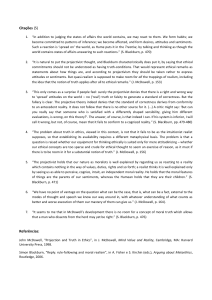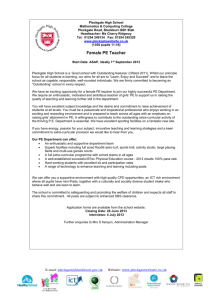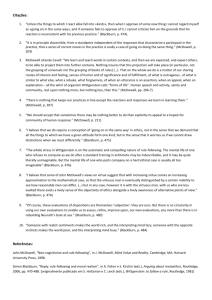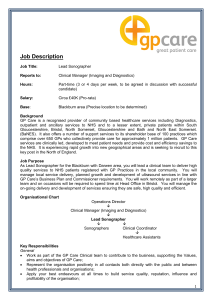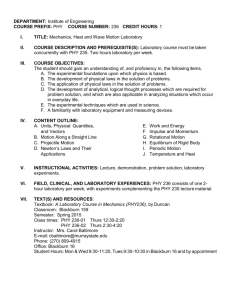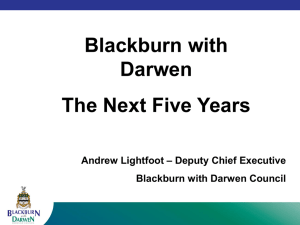Transition to adulthood – A guide for parents, carers and young people
advertisement
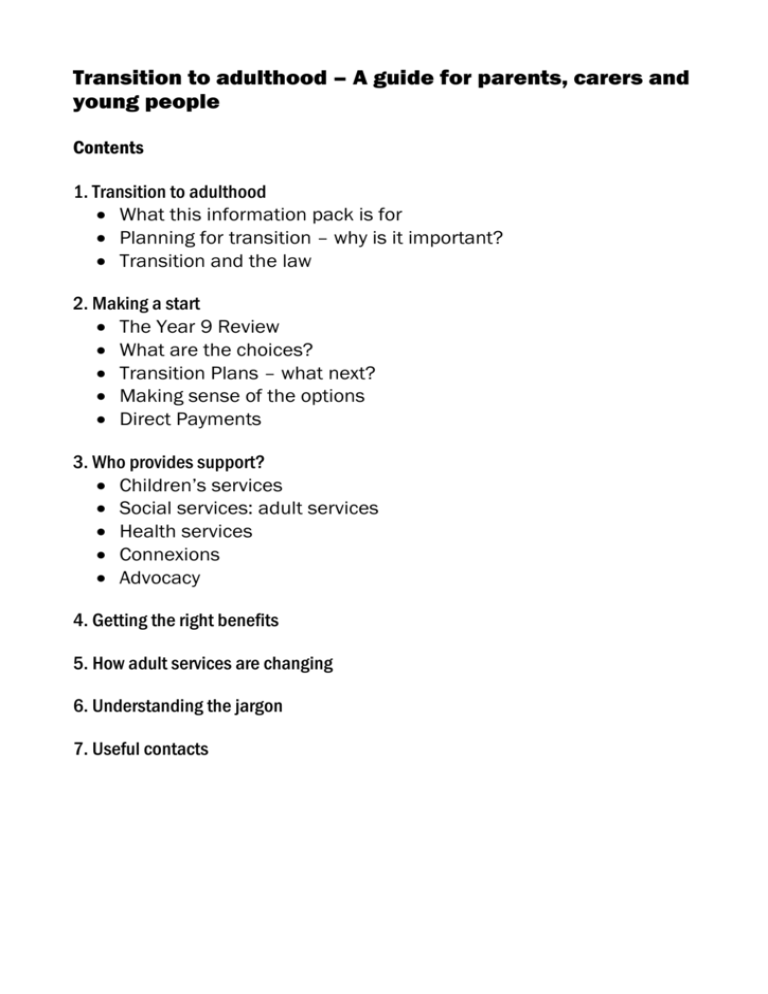
Transition to adulthood – A guide for parents, carers and young people Contents 1. Transition to adulthood What this information pack is for Planning for transition – why is it important? Transition and the law 2. Making a start The Year 9 Review What are the choices? Transition Plans – what next? Making sense of the options Direct Payments 3. Who provides support? Children’s services Social services: adult services Health services Connexions Advocacy 4. Getting the right benefits 5. How adult services are changing 6. Understanding the jargon 7. Useful contacts 2 1. Transition to adulthood For young people with learning disabilities and their families there are many changes that happen throughout the teenage years. The time between the ages of 14 and 19 is often called a time of transition. It is when the unfamiliar, different world of adult social services replaces the security and safety of children’s services. The exact changes will depend on individual circumstances. The changes can be very confusing for young people and their families. What this information pack is for Parents and carers said that there was not enough information available early enough in the process of their children growing up. You wanted information about adult social services or other support available when your children reach the age of 18. We have put together this information pack to give you and the children you care for information about the types of services that might be available. This information could be very important for helping you plan for the future for young people with learning disabilities. The type of support that is available to young people when they reach adulthood is changing. The changes reflect the views of people with learning disabilities, who want to be as independent as possible and make decisions for themselves about their own lives (with appropriate support). There is information about these changes, and what they might mean, later on in this pack. Planning for transition – why is it important? The school year in which a young person becomes 16 years old (Year 11) is the last year of compulsory education. Most young people leave school at this time, although some young people stay at school until they are 18. Other young people, if they have a statement of special educational need, might stay at school until the summer after their 19th birthday. Young people (and their families) who get support from children’s social services are not able to use those services after their 18th birthday. 3 There are two important areas of transition. What will the young person do when their education ends? What is going to replace the services that have been in place from the children’s service once the young person turns 18? The transition process can be complicated, as there are different changes that happen at different times and different ages. Transition and the law There are a number of pieces of legislation and government guidance that shape the transition process. They each affect different services. You can get more information from a booklet called A Transition Guide for All Services, published by the Department for Children, Schools and Families and the Department of Health. It is available to download from: www.everychildmatters.gov.uk www.transitioninfonetwork.org.uk You can get more information from: www.dcsf.gov.uk www.opsi.gov.uk www.dh.gov.uk www.officefordisability.gov.uk www.valuingpeople.gov.uk www.teachernet.gov.uk – this has information about Special Educational Needs and a guide for carers. Other useful websites: www.disability.gov.uk www.direct.gov.uk For more detailed information, please contact the transitions coordinator, James Allerton, on (01254) 584584 4 2. Making a start The Year 9 review For most young people who have a statement of special educational need, the transition process will begin at about age 14, with a meeting that is usually held at school. This meeting is called a Year 9 Review, or Year 9 Transition Review. The school will arrange this meeting, but there are other people who might be invited. The Connexions service has to be invited. This will be the Connexions Personal Adviser or PA. Others who might also take part are social services and health services. This could be a school nurse or a paediatrician, a speech and language therapist or an occupational therapist – whoever is already involved with the young person. Of course, the most important people at the meeting will be the young person and their family. Exactly who is at the meeting depends on individual circumstances. The purpose of the Year 9 Review is to check the young person’s statement and to start a new document called a Transition Plan. The Transition Plan tells everyone who might be involved with the young person what the plans are for their future. It is only the start of the process. Nothing will be decided about a young person’s future at such an early stage. There will be a lot of decisions to be made in the future, and things change. The Plan is an important document and will change in time to reflect any changes in circumstances or ideas. What are the choices? It may seem a long way off but there are only two years between Year 9 and the last year of compulsory education at the end of Year 11 (age 16). That is why it is important to start thinking about the future, so that you have an idea of the options available. These options will depend on individual circumstances. They could include further education, training, going to work, options about daytime support and options about where to live. Further education options Staying on at school Newfield School is the only special school in Blackburn with Darwen that offers an option for post-16 education. This may be available to some young people, 5 where it is felt that the school environment is the best place for them to continue their education. This will be discussed at the Year 9 Review and included in the Transition Plan when it is written. If your child is at a school outside Blackburn with Darwen, you might want to consider if that school has post-16 education. You may also be asked to consider a school closer to home if there is post-16 provision in the current school. Going to a local college Most further education colleges offer courses for people who have learning disabilities. Some colleges offer specialist courses that your child might like. Most schools have links with local colleges and there may be opportunities for young people to spend some time at the link college. There is some information about Blackburn College at the end of this section. Specialist residential colleges There are specialist colleges across the country that cater for young people with learning disabilities. As with local colleges, different specialist colleges have different courses and may cater for students with different levels of abilities and needs. These colleges are run on a residential basis. There is more information about residential colleges at the end of this chapter. Some residential colleges may also offer day placements. Employment options Training for employment Employment is a real option for some young people. The world of work is very different from school. So there are training providers that offer young people the opportunity to work towards getting a job. As well as offering training in work skills, they can also help young people to improve life skills such as reading, writing, maths and IT. They can also help to arrange work experience in local firms. Connexions personal advisers can help young people and their families look at all available options. Employment Some young people will be able to complete some work experience while they are at school. During work experience they may have worked well and want to have a paid job when they leave school. The Connexions personal adviser and the local 6 Job Centre Plus can help people who want to have a job. There are contact details later in this section. Supported Employment Some young people need some support to be able to find and keep a job. There are agencies in Blackburn with Darwen that can offer this support. There are contact details at the end of this chapter. Daytime support options Daytime support for people with learning disabilities is getting better, and we are still improving it. In the past, many people with learning disabilities had a place at a day centre, often for five days a week. But now there are more options. There is more information about how we are improving day services in section five. Options about where to live Living at home Many young people want to still live at home with their parents and families. There is a variety of different support and services that might be available for them. For example, you might be used to having respite or short term breaks. These are also available from adult social services. There is more information about the short breaks service in section 3. Some people might prefer to stay at home and have support without their usual carers. You can discuss this with social services. Independent living options After leaving full time education, some people think about being more independent and living away from home. There are different options available: Living in your own home as a home owner or a tenant Living with a family in a scheme called the shared lives scheme (this used to be called the adult placement scheme) Living with a friend or a small group of friends Living in a sheltered housing scheme. These are all options you can discuss with social services. There is some more information later in this pack. All these areas can become part of the Transition Plan. 7 Transition plans – What next? Following the Year 9 Review, the school will organise annual reviews in year 10 and year 11. You will discuss and update the Transition Plan at these school reviews. If your child stays on at school after year 11, there will be reviews every year at which you can discuss and update the Transition Plan again. In the time leading up to leaving school there are many different people that you and your child can talk to about planning for the future. Family and friends are the most important people, but there are other organisations such as school, social services, health services and Connexions who can also help with the plans. The plan for your child will need to focus on their needs, wishes, desires and hopes for the future. There are different ways of developing plans. Sometimes these are called ‘person centred plans’. Further information The Department for Children, Schools and Families (DCSF) website has a lot of information about education policy. There are links to other resources and areas of information for parents. www.dcsf.gov.uk Aiming High for Disabled Children is the government’s strategy for improving services for disabled children. www.everychildmatters.gov.uk/socialcare/ahdc The Association of National Specialist Colleges has information about specialist and residential colleges. www.natspec.org.uk Mencap has produced leaflets that give information about a number of topics. There are leaflets for parents and carers as well as accessible versions for people with learning disabilities. www.mencap.org.uk The Jobcentre Plus website has useful information about getting a job. There is a specific section to help people who have a disability. www.jobcentreplus.gov.uk The Valuing People support team website has a lot of information about the government’s vision for future services for people with a learning disability. www.valuingpeople.gov.uk 8 The Blackburn with Darwen Borough Council website has information about education, including special needs education. It also has information about children’s and adult social services. www.blackburn.gov.uk The Supported Employment Service in Blackburn with Darwen is called Bootstrap Enterprises. The address is Bootstrap Enterprises, 35 Railway Road, Blackburn, BB1 1EZ. The telephone number is (01254) 680367. www.bootstrap.org.uk On www.urbwd.com you can search for things to do with your family, job vacancies in childcare and maps so you can easily see where you live or work and find activities for your children and family nearby www.steps4me.com is a database with opportunities, courses, qualifications and training in Blackburn with Darwen, Blackpool and Lancashire Blackburn College Blackburn College offers lots of courses and supports learners with learning difficulties and disabilities, including those with high support needs. They have courses for 16-19 year olds and people over 19. The college can offer individually designed support packages in an inclusive environment and employs specialist staff to design and deliver them. Blackburn College campus is in the centre of Blackburn and has specialist facilities for personal care needs. Support is available at break and lunchtimes if necessary. The college welcomes visits from parents/carers and learners who want to find out more. Taster sessions can be arranged for those who are not sure about going to college or who are not sure what course they want to do. If you want to talk to someone about further education and the support that Blackburn College can offer, contact them using the details on the next page. 9 Ann Harwood Additional Learning Support Manager a.harwood@blackburn.ac.uk (01254) 292153 Colette Eaton Learning Support Manager for Learning Difficulties and Disabilities, Physical Disability and Mental Health c.eaton@blackburn.ac.uk (01254) 292139 Stuart Walpole Learning Support Manager for Sensory Impairment s.walpole@blackburn.ac.uk (01254) 292139 10 3. Who provides support? As young people approach adulthood, there are a number of important changes in the services that will be provided for them. Generally, young people who have used children’s services will start to use adult services from their 18th birthday. In the transition to adulthood the main agencies that are likely to be involved in providing support will be children’s services, education, adult social services, health services and Connexions. Children’s services If you need support before your child reaches 18, you will need to contact the Council’s children’s services. This brings together social care services and school age education services. When you contact them directly, through school or your GP, there will be an assessment of needs and an agreement about how those needs might best be met. This agreement will take into account the support that is already available to you, but it may also include more specialist support from the children with complex needs team. Children’s social services The children with complex needs team aims to enable disabled children to live as ordinary a life as possible, in their family and community. They work with children, their parents or carers and other agencies. The team provides services to meet assessed needs. Services include care at home, short breaks (or respite), support to use community facilities and play schemes. If your child is 16 and has been in care, they may be entitled to support from the leaving care team when they leave care. Your current social worker will be able to tell you whether this applies to your child. Adult social services When someone reaches the age of 18, they legally become an adult. The law says that anyone who is an adult with a disability has the right to have an assessment of their needs from social services. If a young person has been getting a service funded by children’s social services, responsibility for funding will pass adult social services, although they must first do an assessment. Someone will need to refer your child to the adult learning disability team. If you have a children’s services social worker, they will do this if you want. If you do not have a children’s social worker, you can make the referral yourself. There is a 11 telephone number to call to make a referral to adult social services: (01254) 587547. Adult social services cannot provide services before someone reaches age 18, but they can become involved and start the assessment process earlier than that. After the referral is made, an adult services social worker (sometimes also called a care manager) will be told to do an assessment. They will arrange to visit you. And they will try to get as much information as possible to do a social care assessment. This assessment will say what your child’s needs are. They will then develop a plan to meet those needs. Sometimes needs can be met by family, but sometimes you might need some additional help or support. Once they know your child’s needs, the social worker will be able to explain to you whether a service will be offered. The government has given guidelines to councils called Fair Access to Care Services. These guidelines will be used to let you know whether a service can be offered. For more information, ask your social worker, or visit the council’s website at: www.blackburn.gov.uk/facs You may already have a person centred plan for your son or daughter. The social worker will work with you to see how their assessment and your plan can work together and how needs can best be met. The activities that social services will provide or fund will be written into a Care Plan. We will then buy services from an appropriate agency (sometimes called a provider). If your child is eligible for services that would be funded by social services, they (or you on their behalf) can have a sum of money instead, to use to buy your own support. This is called a Direct Payment. We must offer you the option of having a Direct Payment. More information about Direct Payments is on the Department of Health website, including an easy guide for people with a learning disability. Visit: www.dh.gov.uk/en/SocialCare/Socialcarereform/Personalisation/Directpayment s/index.htm An important difference between child and adult social services After the assessment is done and services put in place, it is very likely that the social worker who did the assessment will no longer be involved. They will make sure that services are running smoothly and will arrange for a review. The first review of a new service must be within 28 days of the start of the service. After that, the service only has to be reviewed once a year, although this can be more 12 often depending on circumstances. After the 28-day review, the social worker (care manager) will no longer be a named social worker for that person. If circumstances change, you can contact social services and we will do another assessment. Adult social services do not usually have a social worker involved if there is no ongoing work, as long as services are in place. Social services and support for carers If you spend a lot of time helping to look after someone who is disabled, you have the legal right to ask for your own assessment of needs as a carer. If you want an assessment of your own needs as a carer, ask your social worker. How to contact social services In Blackburn with Darwen, there is one phone number to contact social services, whether you need to contact adult services or children’s services: (01254) 587547. Press 1 for children’s services or 2 for adult services. The council’s website also has some contact details for social services: www.blackburn.gov.uk/care Health services The move from children’s to adult health teams will depend on your circumstances and your child’s particular health needs. Family doctor Your child’s doctor or GP is usually the first point of contact for health services. A young person’s GP should stay the same as they move into adulthood. Someone who decides to go to residential college may need to register with a GP close to the college. Medical consultants A young person may have a consultant, for example a paediatrician, who is the main health professional. The young person might be referred to an adult services consultant when they reach the age of 18. You may want to discuss with the consultant what will happen in your own situation. School health services Young people who attend special schools may have access to a range of health professionals through school. These can include physiotherapists, speech and 13 language therapists and occupational therapists. When a young person leaves school, it may be necessary to have a referral made to adult health services in order to continue with any therapy as appropriate. Children and Adolescent Mental Health Service (CAMHS) If your child gets support from CAMHS, you may want to discuss with them whether there will be a need to make a referral to adult mental health services. Community learning disability nursing services Some young people get support from the community learning disability nursing service. There is an adult learning disability nursing service. If your child attends Newfield School, the adult service will contact you in the final school year to see if you or your child would like to have a health action plan. The community nursing team is one part of the adult learning disability service run by East Lancashire Primary Care Trust (PCT) on behalf of Blackburn with Darwen PCT. There are other specialist services that are part of the same team, including psychology, speech and language therapy and occupational therapy. The service also has access to a consultant psychiatrist. There are plans to make the adult social services learning disability team and the adult community health learning disability service one single team. There are some more details about this later in this information pack, in the section called “How adult services are changing”. Health Action Plans Valuing People introduced Health Action Plans to coordinate all the health support for someone with a learning disability. Each plan says what current health needs are, and sets out what needs to be done to help that person stay healthy in future. In Blackburn with Darwen, the health action plan is usually done by a learning disability community nurse. The website for Blackburn with Darwen PCT is www.bwdpct.nhs.uk and the website for East Lancs PCT is www.eastlancspct.nhs.uk Connexions Connexions offers a service for all 13 to 19 year olds. They offer a service up to age 25 if a young person has a learning difficulty or disability and had a statement of special educational need at school. 14 Connexions can provide expert guidance, advice and support to help young people make important decisions about their life, education and career choices. Connexions can offer support and advice about things like jobs, learning, health, money and housing. A personal adviser will be there to support a young person when they make decisions about their life, and can help them to overcome some of the barriers that they may face. Young people can see a personal adviser in school or at college or where they are training. There is also a team of advisers at the local Connexions centre and at Darwen Access Point who can offer immediate advice about learning, work and other issues. Personal advisers will attend all school reviews from Year 9 onwards and will be an important point of contact. They will know what kind of education or job or training opportunities might be available for a young person as they leave school and beyond. They can help with application forms for college and training providers, and can help to get funding for things like residential college placements. Connexions in Blackburn with Darwen has a website with a lot of information about the support and advice they offer: www.cx-bwd.co.uk The contact details for Connexions are in the directory of services at the back of this information pack. Advocacy At certain times, it may be difficult to speak up with your point of view or your concerns. Your child may also find it difficult to say what they want to say. In this situation, an advocate can support you or your child on an individual basis. There are different sorts of advocacy. Family can offer great support to each other and can help to influence the way services are provided. People with a learning disability can be supported by an advocate to sort out a problem, challenge a decision, or to help them make a decision for themselves. Many people with a learning disability now meet as self-advocates. They have the confidence to speak up for themselves and want to help others to do so. Advocacy is about supporting people to make their views known to other people. Everybody has the right to use advocacy, whatever their level of ability or need, They have the right to have their views listened to and taken notice of, and to be treated with respect. Advocacy respects the rights of individuals to make their 15 own choices. It can help people build up their confidence and work through issues. You can use an advocate for any length of time, short or long. The advocacy service in Blackburn with Darwen is called East Lancs Advocacy. They work with people over the age of 18, and with families of children with a learning disability. www.elas.org.uk For more information about advocacy, there are several websites: Mencap - www.mencap.org.uk Values in Action - www.viauk.org Citizen Advocacy Information and Training www.citizenadvocacy.org.uk www.bild.org.uk/04advocacy_about.htm 16 4. Getting the right benefits It is very important for a young person to get all the right benefits. This section is a very brief guide to the different benefits that a young person might be able to claim from their 16th birthday. Contact the welfare rights service at Blackburn with Darwen Borough Council as soon as possible to get advice. Your child might be able to claim one or more of the following benefits in their own right: Income Support Incapacity Benefit Disability Living Allowance (DLA) Community Care Grants Working Tax Credit Educational Maintenance Allowance (EMA) Filling in application forms for benefits can be difficult. The welfare benefits team can help. They can also give specific advice about which benefits are available. Getting some benefits can affect whether you get other benefits, so the welfare rights team can advise you about this. Income Support This can be claimed from age 16 for a disabled young person. In some circumstances it can be paid to a young person even if they are still at school or college, or if they are working. Incapacity Benefit This may be paid to people who have health problems or are disabled. You will need to have a letter from the doctor to apply for Incapacity Benefit. A young person may be able to claim both Income Support and Incapacity Benefit. To claim either or both of these benefits, contact your local Job Centre Plus: Blackburn Job Centre Plus (01254) 343600 Darwen Job Centre Plus (01254) 343500 www.jobcentreplus.gov.uk 17 Disability Living Allowance This benefit is paid to people who are disabled or who have health problems. It is paid in two parts, often called ‘components’. Care component – if you need support to take care of yourself, or if you need someone to help you avoid danger. Mobility component – if you need support to get around, or to help you travel safely. Young people may be able to get one or both parts. There are different amounts of payment depending on how much support is needed. You can get more information by calling the Disability Living Allowance enquiry line on 0800 882200. Community Care Grants These can be paid to people who are getting Income Support to help with some types of expenses. There is also money that can be claimed to help a young person to move into their own home. You can apply for Community Care Grants through the local Job Centre Plus. Working Tax Credit This can be applied for by someone who is disabled if they are working for at least 16 hours per week. More information at: www.hmrc.gov.uk/taxcredits/index Educational Maintenance Allowance (EMA) EMA is paid to young people over the age of 16 to help them stay at school or go to college. It can be claimed for a maximum of 3 years. EMA is for people who are on a full time course and whose family income is less than £30,810 a year for the last tax year. It is also paid to all young people who go onto the entry to employment (e2e) programme regardless of parent’s income. You can find out more information about EMA from school or college or from your child’s Connexions personal adviser. 18 More information The contact details for the welfare advice service in Blackburn with Darwen are: Telephone: (01254) 583350 Email: advice@blackburn.gov.uk You can also visit the service in person at the one-stop shops at the Town Hall in Blackburn and the Town Hall in Darwen. This information is also available at www.blackburn.gov.uk You can also get advice from other places: Age Concern – (01254) 266620 Citizen’s Advice Bureau – (01254) 671211 St John’s Centre, Victoria Street, Blackburn (check for opening times) advice@blackburncab.co.uk Women’s Centre – (01254) 583032 advice@womenscentre.org 19 20 5. How adult services are changing Valuing People In March 2001, the Government published a document called Valuing People. It set out their vision for services for people with learning disabilities. Valuing People said that services, people with learning disabilities and their families and carers should work together to make sure that: people’s rights as individuals are respected; people enjoy as much independence as possible; people are supported to make choices and decisions about the things that matter to them; people are included in the life of the community and have access to the same opportunities as everyone else. Valuing People has a lot to say about health, day services, employment, person centred planning and a wide range of other issues. It sets out targets for the main agencies that support people with a learning disability. It asked for each area to set up a Partnership Board to monitor progress in all of these services. In 2007, the Government published a follow-up paper called Valuing People Now. This asked for comments about the original Valuing People and how much progress had been made. These comments are being collected and a further paper will be published soon. Partnership boards The Learning Disability Partnership Board in Blackburn with Darwen has five main themes that are the focus of a lot of work in the coming months and years. These are: health and wellbeing housing transport and access person centred planning and approaches partnership involvement transitions Lots of different people are part of the partnership board, including parents and carers, people who have a learning disability and different sections of the council. There are also people who represent Connexions, health services and day services, as well as providers of other services. There is information about the partnership board at: www.blackburn.gov.uk/ldpartnership 21 More information There is more information about partnership boards and Valuing People available from the Valuing People Support Team website: www.valuingpeople.gov.uk Day services Valuing People said that day services should become more modern. This has already started in Blackburn with Darwen. The Mowbray Day Centre has closed and the service moved to Accrington Road. The way day services are run is still changing. Valuing People said that day services need to offer a much wider range of opportunities. Good day services should help people with learning disabilities: decide how they want to spend their time – person centred plans will help people to do this; participate in their local community by living, working and learning alongside other people; have opportunities to contribute to and benefit from community life and to be seen and valued as equal members; have opportunities to build and sustain valued relationships have the same opportunities as everyone else to access ordinary services, for example housing services, leisure and cultural activities; have a service that is person-centred, that is sustainable and that promotes dignity, safety and independence. The modernisation of day services means a change in the type of service that may be available for young people when they leave school. Individual Budgets Valuing People Now talked a lot about ‘personalisation’. This is about people having much more control of their own lives. An individual budget, sometimes called self-directed support, is meant to work a bit like Direct Payments. The difference is that it starts with a self assessment questionnaire, not an assessment by a social worker. This will result in the person knowing how much money they will have to spend to provide the support that they want. A detailed support plan must then be done. There are many different ways of getting help to complete the plan. The idea is that people will be able to arrange 22 their own support in the way that makes the most sense to them, and that there will be a lot more flexibility about the kind of support that they can choose. We are working to introduce self-directed support and individual budgets in Blackburn with Darwen. If you would like more information, contact the SelfDirected Support Coordinator on (01254) 584583 or by email: bernie.horne@blackburn.gov.uk. 23 24 6. Understanding the jargon There are many words and phrases used by professionals and members of staff who work with people with learning disabilities. The following is a list of some of the words and phrases that you might come across and a brief explanation about what they mean. BwD Blackburn with Darwen BwDPCT Blackburn with Darwen Primary Care Trust CAMHS Child and Adolescent Mental Health Service. CDC Child Development Centre. Brings together a range of different health services to disabled children and their families. CIN Child in Need. A term used within children’s social care services CLA Child Looked After CLD Complex Learning Disabilities Code of Practice This is a guide for schools and Local Education Authorities about the assessment of children and young people with special educational needs and the assistance that can be given CNS Complex Needs Service – this is the umbrella term for education and children’s social services CwD Children with disabilities DCSF Department for Children, Schools and Families 25 DfES Department for Education and Skills – this no longer exists; it has been replaced by the Department for Children, Schools and Families (DCSF) DLA Disability Living Allowance DP Direct Payments DPA Disabled Persons Act EBD Emotional and Behavioural Difficulties – this is sometimes used in statements of educational need. E2E Entry to Employment – a way of getting qualifications and skills to get a job or to get into education. You can get more information from Connexions. ELP Essential Lifestyle Plan – this is a type of person centred plan. EMA Education Maintenance Allowance EP Educational Psychologist – the psychologist has a key role in preparing the statement of special education needs. EWO Education Welfare Officer FACS Fair Access to Care Services – guidelines about levels of need when social services carry out an assessment. FE Further Education – usually means from 16 years and upwards (often at college). GP General Practitioner, or family doctor. 26 HAP Health Action Plan IB Individual Budget IEP Individual Education Plan – usually developed at school. In Control A specific project that is introducing individual budgets with many councils. LA Local Authority – the council. LD Learning Disability LDD Learning Difficulties and Disabilities – sometimes used in children’s services. LEA Local Education Authority LSC Learning and Skills Council – the organisation which funds post 16 education. MLD Moderate Learning Difficulties/Mild Learning Disability OT Occupational Therapist or Therapy PA Personal Adviser – Connexions workers are called Personal Advisers. Personal advisers can also be people employed to support disabled people through direct payments. PCP Person Centred Planning or Person Centred Plan PCT Primary Care Trust – this is part of the health service. 27 PMLD Profound Multiple Learning Difficulties – a category of statement of educational need. SEN Special Educational Needs SENCo Special Educational Needs Coordinator – a designated person in school. SLD Severe Learning Difficulty – a category of Special Educational Need. SSD Social Services Directorate or Social Services Department. SpLD Specific Learning Difficulty – a category of Special Educational Need. SSA Special Support Assistant Statement A document that sets out the specific educational needs of a child and the assistance that will be provided to that child while at school. VPST Valuing People Support Team 28 7. Useful contacts Health services Adults Community Learning Disability Team, Bridge House, Whalley Banks, Blackburn, BB2 1NT. (01254) 695698 Children Paediatric Learning Disability Team, Suite C1, Northbridge House, Elm Street, Burnley, BB10 1AJ. (01282) 714395 CAMHS (Children and Adolescent Mental Health Services) Daisyfield Centre, Appleby Street, Blackburn, BB1 3BL (01254) 226280 Local education authority The Exchange Building, Ainsworth Street, Blackburn, BB1 6AD. (01254) 666871 or (01254) 666872 Connexions Blackburn - Blackburn Connexions Centre, Ground Floor, St John’s Court, Ainsworth Street, Blackburn, BB1 6AD Telephone: (01254) 267780 Fax: (01254) 267788 www.cx-bwd.co.uk Darwen - Darwen Access Point/Connexions Centre, Duckworth Street, Darwen, BB3 1AT Telephone: (01254) 707551 Fax: (01254) 707541 www.cx-bwd.co.uk 29 Social services Customer Liaison Office (for general enquiries) (01254) 587547 Children’s services Children's services department, Blackburn with Darwen Borough Council, Town Hall, King William Street, Blackburn, BB1 7DY Adult services Adult social services, Blackburn with Darwen Borough Council, PO Box 478, Blackburn, BB2 9BR Town Hall – main switchboard (01254) 585585 Welfare rights advice (01254) 583350 advice@blackburn.gov.uk Advocacy East Lancs Advocacy, 54 Blackburn Road, Accrington BB5 1LE Telephone: (01254) 301030 Fax: (01254) 301033 www.elas.org.uk Job Centre Plus Blackburn Job Centre Plus (01254) 343600 Darwen Job Centre Plus (01254) 343500 30 Local colleges of further education Blackburn College, Feilden Street, Blackburn, BB2 1LH (01254) 55144 Additional Learning Support – Manager (Ann Harwood) (01254) 292254/292148 www.blackburn.ac.uk Myerscough College has a campus at Witton Park in Blackburn. The main college details are: Myerscough College, Bilsborrow, Preston, Lancashire PR3 0RY (01995) 642222 for course enquiries enquiries@myerscough.ac.uk The Blackburn site details are: Myerscough College, Witton Park, Preston Old Road, Blackburn, BB2 2TP (01254) 695428 eastlancs@myerscough.ac.uk www.myerscough.ac.uk Carers’ services Blackburn with Darwen Carers Service, Oakenhurst Road, Blackburn, BB2 1SN (01254) 688440 (01254) 688441 Supported Employment Service Bootstrap Enterprises, 35 Railway Road, Blackburn, BB1 1EZ (01254) 680367. www.bootstrap.org.uk 31

